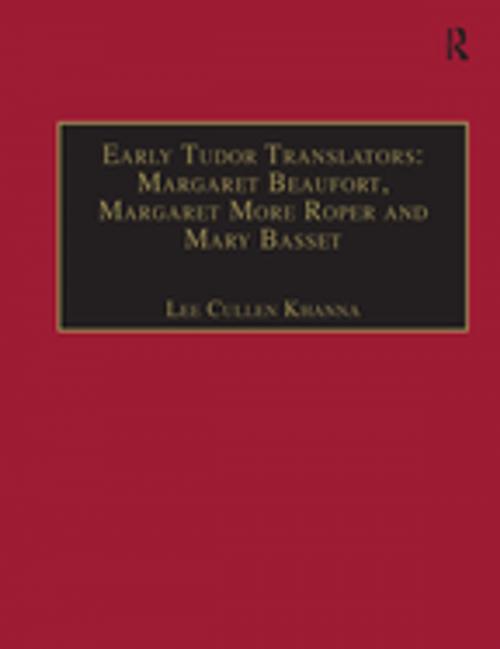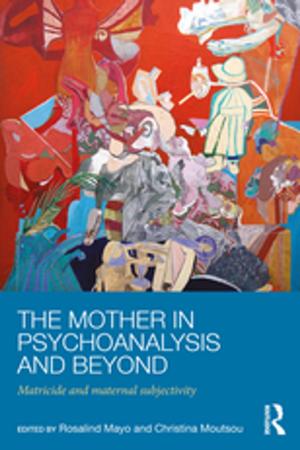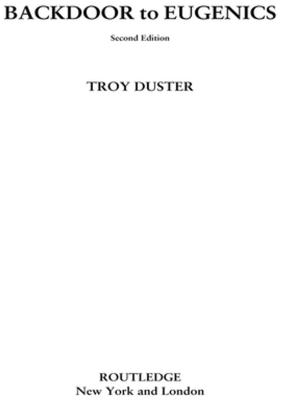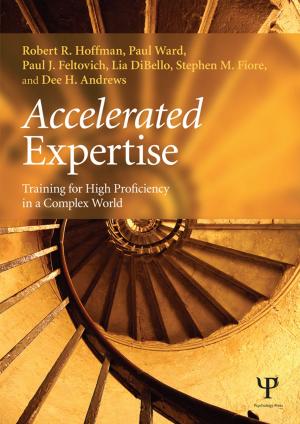Early Tudor Translators: Margaret Beaufort, Margaret More Roper and Mary Basset
Printed Writings 1500–1640: Series I, Part Two, Volume 4
Fiction & Literature, Literary Theory & Criticism| Author: | Lee Cullen Khanna | ISBN: | 9781351942256 |
| Publisher: | Taylor and Francis | Publication: | December 5, 2016 |
| Imprint: | Routledge | Language: | English |
| Author: | Lee Cullen Khanna |
| ISBN: | 9781351942256 |
| Publisher: | Taylor and Francis |
| Publication: | December 5, 2016 |
| Imprint: | Routledge |
| Language: | English |
This volume presents the texts of three Englishwomen remarkable both for writing and publishing their work during the first half of the sixteenth century. They also proved themselves nimble survivors of political and religious turmoil, Beaufort suffering for her Lancastrian connections and Roper and Basset for their Catholic allegiance. Significantly, these women turned to translation and to religious texts for their writing and publishing. The choice of devotional treatises authored by men not only mitigated the threat of the female pen, but more important to these writers, enabled them to perform spiritual and material work. Translation was considered to be the fruit of faith, contributing to the writer's own salvation and that of others, notably other women. Margaret Beaufort - Countess of Richmond and Derby, and mother of Henry VII. Lady Margaret's translation of the fourth book of Thomas à Kempis' De imitatione Christi was the first in English. Published in 1504 with Books 1-3, translated by William Atkinson. We reprint Pynson's 1517 edition notable for the clarity of its texts and woodcuts. Her translation from a French version of the anonymous text Speculum aureum animae peccatricis was published by Pynson in about 1506. It was reprinted three times after her death, twice in 1522 and once in 1526. We reprint the 1526 edition held by the British Library. Margaret More Roper was the eldest child of Sir Thomas More and was said to have been an outstanding scholar and writer. Her only published work is the translation reproduced here - Erasmus: A devout treatise upon the Pater noster, published c.1526 by T. Berthelet Mary Roper Clarke Basset was the daughter of Margaret Roper. She was a lady-in-waiting to Queen Mary and an expert in Latin and Greek. Reprinted here is a copy of her translation of her grandfather's final Tower work Of the sorrowe ... of Christ before hys taking from the 1557 edition of The English Workes of Sir Thomas More.
This volume presents the texts of three Englishwomen remarkable both for writing and publishing their work during the first half of the sixteenth century. They also proved themselves nimble survivors of political and religious turmoil, Beaufort suffering for her Lancastrian connections and Roper and Basset for their Catholic allegiance. Significantly, these women turned to translation and to religious texts for their writing and publishing. The choice of devotional treatises authored by men not only mitigated the threat of the female pen, but more important to these writers, enabled them to perform spiritual and material work. Translation was considered to be the fruit of faith, contributing to the writer's own salvation and that of others, notably other women. Margaret Beaufort - Countess of Richmond and Derby, and mother of Henry VII. Lady Margaret's translation of the fourth book of Thomas à Kempis' De imitatione Christi was the first in English. Published in 1504 with Books 1-3, translated by William Atkinson. We reprint Pynson's 1517 edition notable for the clarity of its texts and woodcuts. Her translation from a French version of the anonymous text Speculum aureum animae peccatricis was published by Pynson in about 1506. It was reprinted three times after her death, twice in 1522 and once in 1526. We reprint the 1526 edition held by the British Library. Margaret More Roper was the eldest child of Sir Thomas More and was said to have been an outstanding scholar and writer. Her only published work is the translation reproduced here - Erasmus: A devout treatise upon the Pater noster, published c.1526 by T. Berthelet Mary Roper Clarke Basset was the daughter of Margaret Roper. She was a lady-in-waiting to Queen Mary and an expert in Latin and Greek. Reprinted here is a copy of her translation of her grandfather's final Tower work Of the sorrowe ... of Christ before hys taking from the 1557 edition of The English Workes of Sir Thomas More.















